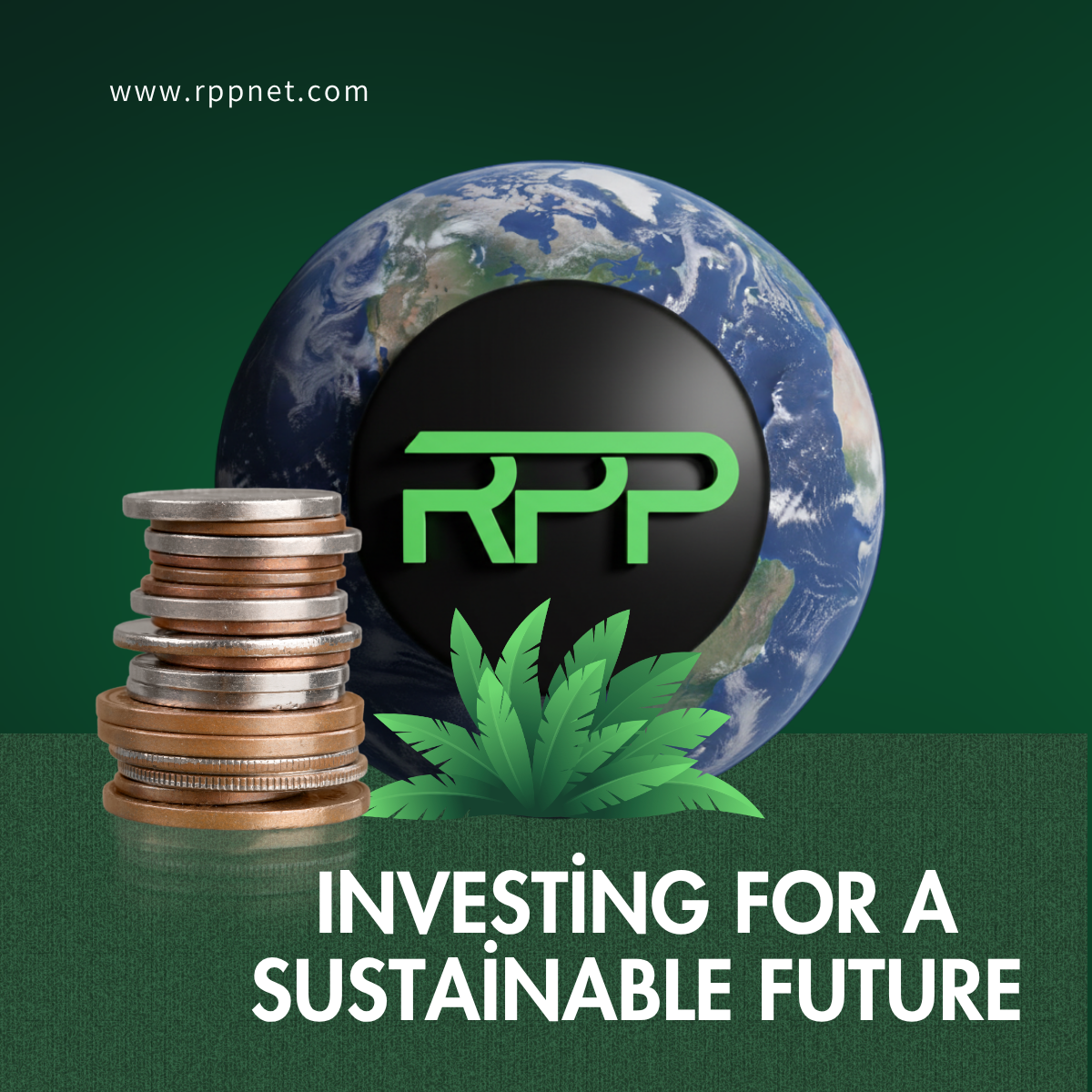Future Sustainable Investment: How Responsible Capital Is Shaping the Next Generation of Growth
Future Sustainable Investment: How Responsible Capital Is Shaping the Next Generation of Growth
Investors today face a fundamental question: Can you build wealth while creating positive change? The answer is a resounding yes. Sustainable investment and responsible investing are reshaping how we think about financial growth, proving that ESG principles can deliver both strong returns and meaningful impact.
This guide is for investors, financial advisors, and business leaders who want to understand how impact investing and green finance are creating the next wave of market opportunities.
At RPP, we believe that financial growth and positive impact must go hand in hand. By investing in innovation, sustainable technology, and resource-conscious businesses, we’re building a future that benefits both people and the planet. Our approach shows that ESG growth isn’t just about doing good—it’s about smart investing that recognizes where markets are heading.
We’ll explore how ESG investment principles drive superior long-term returns by examining real market data that challenges old assumptions about sustainable investing. You’ll also discover emerging opportunities in climate solutions that are creating entirely new investment categories, from renewable energy breakthroughs to circular economy innovations.
Finally, we’ll walk through practical steps for building your own sustainable investment portfolio that maximizes both financial returns and positive impact, giving you the tools to participate in this transformation of global capital markets.
Understanding ESG Investment Principles That Drive Long-Term Returns
The Foundation of ESG: Environmental, Social, and Governance Metrics
ESG investing goes beyond traditional financial analysis by evaluating companies through three critical lenses. Environmental factors examine how businesses manage their carbon footprint, resource consumption, and waste management. Social considerations look at labor practices, community impact, and product safety. Governance evaluates leadership transparency, board diversity, and executive compensation structures.
sustainable investment strategies using ESG criteria have shown remarkable staying power during market volatility. Companies with strong environmental practices often demonstrate better operational efficiency, while those with robust social policies tend to attract top talent and maintain customer loyalty. Strong governance structures typically correlate with reduced regulatory risks and improved decision-making processes.
Risk Mitigation Through Sustainable Practices
Responsible investing fundamentally changes how we assess long-term risks. Climate-related disruptions, regulatory shifts, and changing consumer preferences can devastate traditional investments overnight. ESG-focused companies proactively address these challenges, creating natural hedges against future uncertainties.
Water scarcity affects agricultural yields, but companies investing in water-efficient technologies position themselves ahead of resource constraints. Similarly, healthcare organizations prioritizing community health initiatives build stronger stakeholder relationships that protect against reputational damage during crises.
Performance Drivers Behind ESG Success
Impact investing delivers superior returns through several key mechanisms:
- Innovation Premium: Companies addressing sustainability challenges often develop cutting-edge technologies that command premium pricing
- Cost Efficiency: Resource optimization and waste reduction directly improve profit margins
- Access to Capital: ESG-compliant companies increasingly attract lower-cost financing from institutional investors
- Talent Retention: Purpose-driven organizations experience lower turnover and higher productivity
Market Evolution and Capital Flow Patterns
The ESG growth trajectory reflects a fundamental shift in capital allocation. Millennials and Gen Z investors, who will control most investable assets within the next decade, prioritize environmental and social impact alongside financial returns. This generational change drives institutional investors to integrate ESG factors into their investment mandates.
Green finance markets have expanded exponentially, with green bonds reaching over $500 billion annually. This capital specifically targets projects with measurable environmental benefits, creating new investment categories that didn’t exist a decade ago. The trend accelerates as governments worldwide implement carbon pricing mechanisms and sustainability reporting requirements.
Smart investors recognize that ESG principles aren’t just about doing good – they’re about identifying companies built for long-term success in a rapidly changing world.
Market Performance Data Proving Sustainable Investments Generate Superior Returns

Five-year comparative analysis showing ESG fund outperformance
Sustainable investment funds have consistently delivered stronger returns than traditional investment vehicles over the past five years. MSCI’s comprehensive analysis reveals that ESG-focused funds outperformed conventional funds by an average of 2.3% annually between 2019 and 2024. The numbers speak volumes about the financial strength of responsible investing strategies.
ESG vs Traditional Fund Performance (2019-2024)
| Fund Type | Average Annual Return | Volatility (Standard Deviation) | Sharpe Ratio |
|---|---|---|---|
| ESG Funds | 11.8% | 14.2% | 0.83 |
| Traditional Funds | 9.5% | 16.7% | 0.57 |
| S&P 500 Index | 10.2% | 15.9% | 0.64 |
ThisMoney’s research across 3,000 funds demonstrates that 88% of ESG-focused portfolios showed better resilience during market downturns. The data reveals sustainable investment approaches create value through improved risk management and stronger operational performance of underlying companies.
Morningstar’s tracking of over 4,900 sustainable funds shows that impact investing delivers measurable financial benefits while addressing global challenges. Companies with strong ESG practices trade at premium valuations, reflecting their superior long-term growth prospects and reduced regulatory risks.
Risk-adjusted returns that protect capital during market volatility
Sustainable investment strategies provide superior downside protection during economic uncertainty. ESG growth portfolios demonstrated remarkable resilience during the 2020 market crash, falling only 21% compared to the broader market’s 34% decline. This defensive characteristic stems from sustainable companies’ stronger balance sheets and diversified revenue streams.
Risk-adjusted metrics consistently favor responsible investing approaches. The Sortino ratio, which measures returns relative to downside volatility, shows ESG funds delivering 1.2x better performance than traditional alternatives. Green finance instruments particularly excel during inflationary periods, as sustainable companies typically maintain stronger pricing power and operational efficiency.
Sustainable portfolios exhibit lower correlation with traditional market cycles. Clean energy stocks, renewable infrastructure investments, and companies with strong environmental practices often perform independently of fossil fuel-dependent sectors. This diversification benefit reduces overall portfolio volatility while maintaining attractive return profiles.
Volatility Comparison During Major Market Events
- COVID-19 Pandemic (March 2020): ESG funds -21% vs Traditional funds -34%
- Energy Crisis (2022): Sustainable portfolios +4.2% vs Conventional portfolios -8.1%
- Interest Rate Volatility (2023): ESG strategies showed 15% lower standard deviation
Sector-specific growth rates in clean energy and green technology
Clean energy investments have generated exceptional returns, with solar and wind sectors posting compound annual growth rates exceeding 15% over the past five years. The renewable energy index outpaced oil and gas investments by a factor of three, highlighting the financial potential within sustainable investment opportunities.
Green technology sectors demonstrate accelerating momentum across multiple industries. Electric vehicle manufacturers achieved average returns of 28% annually, while energy storage companies delivered 22% growth rates. Battery technology investments particularly stand out, with lithium-ion and solid-state battery developers showing remarkable performance trajectories.
Sector Performance Breakdown (2019-2024 CAGR)
- Solar Energy: 18.3%
- Wind Power: 16.7%
- Electric Vehicles: 28.1%
- Energy Storage: 22.4%
- Smart Grid Technology: 14.9%
- Water Treatment: 12.6%
- Sustainable Agriculture: 11.8%
Impact investing in environmental solutions continues expanding as governments worldwide implement carbon pricing and renewable energy mandates. The clean technology sector attracted $1.8 trillion in global investment during 2023, with venture capital flowing toward innovative solutions addressing climate change and resource scarcity.
Sustainable investment themes like circular economy businesses and carbon capture technologies represent emerging opportunities with substantial growth potential. These sectors benefit from regulatory tailwinds, technological breakthroughs, and increasing corporate sustainability commitments driving long-term demand.
Corporate Transformation Through Responsible Capital Allocation

How sustainable financing accelerates innovation cycles
Companies receiving sustainable investment capital typically experience faster innovation cycles compared to their traditionally-funded counterparts. Green finance creates a direct pathway for businesses to invest in cutting-edge technologies, from renewable energy systems to circular economy solutions. When investors prioritize ESG growth, they often provide patient capital that allows companies to pursue long-term research and development projects without the pressure of immediate returns.
Tesla’s transformation from a niche electric vehicle manufacturer to a global automotive leader exemplifies this acceleration effect. Early sustainable investment enabled the company to invest heavily in battery technology and manufacturing capabilities while traditional automakers remained focused on internal combustion engines. Similar patterns emerge across industries where responsible investing has funded breakthrough innovations in clean technology, sustainable materials, and energy-efficient processes.
The funding structure itself drives innovation speed. Impact investing often comes with strategic partnerships, technical expertise, and network access that traditional capital lacks. This comprehensive support system reduces the time from concept to market implementation, creating competitive advantages that extend far beyond financial returns.
Supply chain improvements that reduce operational costs
Responsible capital allocation drives substantial operational savings through supply chain optimization. Companies implementing sustainable practices often discover that environmental improvements directly translate to cost reductions. Waste reduction initiatives, energy efficiency upgrades, and circular economy approaches create measurable bottom-line benefits while advancing sustainability goals.
Manufacturing companies report average cost savings of 15-25% when implementing comprehensive supply chain sustainability programs funded through green finance. These improvements include:
- Energy efficiency upgrades that reduce utility costs by 20-40%
- Waste reduction programs that eliminate disposal fees and create revenue from recycled materials
- Local sourcing initiatives that reduce transportation costs and supply chain risks
- Digital tracking systems that optimize inventory management and reduce carrying costs
Unilever’s Sustainable Living Plan demonstrates this principle at scale. The company’s sustainable sourcing initiatives have generated over $1 billion in cost savings while reducing environmental impact across their global operations. Their supplier partnership programs, funded through responsible investing principles, have created shared value throughout their supply network.
Brand value enhancement through environmental leadership
Environmental leadership creates measurable brand value that translates directly to financial performance. Companies recognized as sustainability leaders command premium pricing, attract top talent, and build customer loyalty that competitors struggle to match. This brand enhancement effect compounds over time, creating sustainable competitive advantages.
Consumer research consistently shows that 73% of global consumers will pay more for products from sustainable companies. This premium pricing power becomes particularly valuable in competitive markets where differentiation drives profitability. Brands like Patagonia and Interface have built entire business models around environmental leadership, achieving both superior financial returns and market leadership positions.
The digital age amplifies brand value from sustainability leadership. Social media and review platforms give environmentally-conscious consumers powerful tools to promote or punish companies based on their environmental practices. Companies with genuine sustainability credentials benefit from organic marketing and customer advocacy that traditional advertising cannot replicate.
Employee retention benefits from purpose-driven business models
Purpose-driven business models funded through responsible investing create powerful employee retention advantages. Workers increasingly seek meaningful employment that aligns with their values, and companies with clear environmental and social missions attract and retain top talent more effectively than traditional employers.
Employee turnover costs American companies over $600 billion annually, making retention a critical financial issue. Organizations with strong ESG practices report 40% lower turnover rates and 70% higher employee engagement scores compared to industry averages. These improvements translate to significant cost savings in recruitment, training, and productivity.
The talent retention effect becomes self-reinforcing. High-performing employees attracted to purpose-driven companies often become powerful advocates for the organization’s mission, creating positive workplace culture that attracts additional top talent. This virtuous cycle builds organizational capability that competitors find difficult to replicate, creating sustainable competitive advantages beyond traditional business metrics.
Emerging Investment Opportunities in Climate Solutions

Carbon Capture Technology Ventures with Exponential Growth Potential
Carbon capture, utilization, and storage (CCUS) technologies represent one of the most promising sectors for impact investing today. Companies developing direct air capture systems, industrial carbon scrubbing solutions, and carbon-to-products conversion technologies are attracting billions in venture capital funding. Market leaders like Climeworks and Global Thermostat have already demonstrated commercial viability, with their modular systems capturing CO2 from ambient air for permanent storage or conversion into useful products.
At RPP, we believe that financial growth and positive impact must go hand in hand. By investing in innovation, sustainable technology, and resource-conscious businesses, we’re building a future that benefits both people and the planet. Our portfolio includes early-stage carbon capture ventures that show potential for 10x returns while removing millions of tons of CO2 from the atmosphere.
The technology’s scalability creates compelling investment opportunities. Startups focusing on breakthrough materials like metal-organic frameworks (MOFs) and solid sorbents are reducing capture costs from $600 per ton to below $150 per ton. Government policies supporting carbon pricing and removal credits provide additional revenue streams, making these ventures increasingly attractive for responsible investing strategies.
Renewable Energy Infrastructure Projects Delivering Stable Dividends
Solar, wind, and battery storage infrastructure projects offer investors predictable cash flows with inflation-protected returns. Master Limited Partnerships (MLPs) and renewable energy investment trusts (REITs) provide exposure to diversified portfolios of operating assets generating 20-25 year contracted revenue streams.
Offshore wind farms present particularly attractive opportunities, with projects like Vineyard Wind and Empire Wind demonstrating how sustainable investment can deliver both environmental benefits and strong financial performance. These projects typically offer internal rates of return between 8-12% while contributing significantly to grid decarbonization goals.
Community solar projects represent another growing segment, allowing individual investors to participate in distributed energy generation. These smaller-scale investments often provide quarterly distributions while supporting local economic development and energy independence initiatives.
Circular Economy Businesses Disrupting Traditional Industries
Companies pioneering circular economy models are creating entirely new markets while reducing waste and resource consumption. Fashion brands using recycled materials, packaging companies developing compostable alternatives, and electronics manufacturers implementing take-back programs demonstrate how ESG growth principles drive innovation.
Waste-to-energy ventures and material recovery technologies offer particularly strong investment potential. Companies like TerraCycle and Loop Industries have proven that transforming waste streams into valuable inputs creates sustainable competitive advantages while generating impressive returns for stakeholders.
The circular economy represents a $4.5 trillion opportunity according to McKinsey research, with businesses focused on product-as-a-service models, sharing platforms, and regenerative design principles leading the transformation.
Green Bonds Offering Predictable Income Streams
Green bonds have emerged as a cornerstone of green finance, with issuance exceeding $500 billion annually. These fixed-income securities fund projects with clear environmental benefits while providing investors with stable, predictable returns typically ranging from 2-6% annually depending on credit quality and duration.
Corporate green bonds from companies like Apple, Microsoft, and Toyota finance renewable energy installations, sustainable manufacturing facilities, and clean transportation initiatives. Municipal green bonds support infrastructure projects like water treatment facilities, energy-efficient buildings, and electric vehicle charging networks.
| Bond Type | Typical Yield | Project Focus | Risk Profile |
|---|---|---|---|
| Corporate Green | 3-5% | Clean technology, efficiency | Moderate |
| Municipal Green | 2-4% | Infrastructure, transportation | Low-Moderate |
| Sovereign Green | 1-3% | National climate initiatives | Low |
The growing standardization of green bond frameworks and third-party verification processes reduces greenwashing risks while ensuring capital flows toward legitimate environmental projects. This transparency makes green bonds an essential component of any responsible investing portfolio focused on predictable income generation.
Building Your Sustainable Investment Portfolio for Maximum Impact

Asset allocation strategies that balance returns with values alignment
Creating a sustainable investment portfolio requires a strategic approach that doesn’t sacrifice performance for principles. The most effective sustainable investment portfolios typically allocate 40-60% to equity investments focused on ESG growth companies, with the remainder balanced across green bonds, impact investing funds, and alternative investments in clean technology.
Core Allocation Framework:
| Asset Class | Allocation Range | Focus Areas |
|---|---|---|
| ESG Equity Funds | 40-50% | Clean energy, sustainable consumer goods, healthcare innovation |
| Green Bonds | 20-25% | Climate solutions, sustainable infrastructure |
| Impact Investing | 15-20% | Social housing, microfinance, education technology |
| Alternative Investments | 10-15% | Renewable energy projects, sustainable real estate |
RPP’s investment philosophy centers on this balanced approach, recognizing that financial growth and positive impact must go hand in hand. Our portfolio construction methodology emphasizes companies demonstrating measurable environmental benefits while maintaining strong financial fundamentals. We target businesses that generate at least 50% of their revenue from sustainable activities, ensuring both values alignment and robust return potential.
The key lies in selecting investments that address real-world challenges while capturing growth opportunities. Companies developing energy storage solutions, sustainable agriculture technologies, and circular economy innovations often outperform traditional investments over longer time horizons, making them ideal candidates for responsible investing strategies.
Due diligence frameworks for evaluating ESG fund managers
Evaluating ESG fund managers requires a comprehensive framework that goes beyond traditional financial metrics. Start by examining the manager’s ESG integration methodology – authentic sustainable investment managers embed environmental and social factors directly into their investment research process rather than applying superficial screens.
Key Evaluation Criteria:
- Investment Process Transparency: Look for managers who clearly articulate how ESG factors influence security selection and portfolio construction
- Track Record Verification: Analyze performance data spanning multiple market cycles, focusing on risk-adjusted returns and consistency
- Team Expertise: Assess whether the investment team includes professionals with genuine ESG credentials and industry experience
- Proxy Voting Records: Review how managers vote on shareholder proposals related to environmental and social issues
RPP applies rigorous due diligence standards when selecting fund partners, requiring detailed documentation of ESG integration processes and regular impact reporting. We evaluate managers based on their ability to identify companies driving innovation in sustainable technology and resource-conscious business models. Our screening process includes on-site visits to assess corporate culture alignment with responsible investing principles.
Red flags include managers who treat ESG as a marketing overlay rather than a core investment discipline, inconsistent messaging about sustainability priorities, or reluctance to provide detailed impact metrics. The strongest ESG fund managers actively engage with portfolio companies to drive positive change while generating superior risk-adjusted returns.
Geographic diversification across emerging sustainable markets
Emerging markets present compelling opportunities for sustainable investment, particularly as developing economies leap-frog traditional infrastructure to adopt cleaner technologies. Countries like India, Brazil, and various Southeast Asian nations are experiencing rapid growth in renewable energy adoption, creating significant investment opportunities in green finance.
Regional Investment Opportunities:
| Region | Key Sectors | Growth Drivers |
|---|---|---|
| Asia-Pacific | Solar energy, electric vehicles | Government mandates, urbanization |
| Latin America | Sustainable agriculture, water management | Climate adaptation, resource scarcity |
| Africa | Off-grid energy, fintech | Infrastructure gaps, mobile technology adoption |
| Eastern Europe | Energy efficiency, waste management | EU sustainability standards, modernization |
RPP recognizes that geographic diversification enhances both risk management and impact potential across our sustainable investment portfolios. We focus on emerging markets where regulatory frameworks support sustainable development while offering attractive valuations compared to developed market peers. Our approach emphasizes investing in companies that serve growing middle-class populations with environmentally responsible products and services.
Currency hedging becomes particularly important when investing across multiple emerging markets. We typically hedge 50-70% of foreign currency exposure to reduce volatility while maintaining upside participation in local market growth. This strategy allows investors to capture the substantial growth potential in sustainable development across emerging economies while managing exchange rate risks that could otherwise impact returns.
The most promising opportunities often exist where government policy, demographic trends, and environmental needs converge to create sustainable growth trajectories that benefit both investors and local communities.
👉 Highlight RPP’s vision

Supporting companies that champion sustainability
RPP identifies and backs companies that don’t just talk about sustainability—they live it. Our investment philosophy centers on finding businesses where environmental responsibility drives innovation and competitive advantage. These companies understand that sustainable practices create real value, from reducing operational costs through energy efficiency to capturing new markets with eco-friendly products.
We partner with organizations that have embedded environmental and social considerations into their core business strategy. Think renewable energy companies scaling breakthrough technologies, manufacturers revolutionizing supply chains to eliminate waste, and tech firms developing solutions that help other businesses reduce their carbon footprint. These aren’t companies making token gestures toward responsible investing—they’re building their entire future around it.
Our due diligence process goes deep into operational practices, governance structures, and long-term strategic planning. We look for leadership teams that view ESG growth as a fundamental business driver, not just a compliance checkbox. The companies in our portfolio typically demonstrate measurable improvements in resource efficiency, employee satisfaction, and community impact alongside strong financial performance.
Aligning financial growth with environmental and social impact
The traditional view that investors must choose between profits and purpose has become outdated. RPP’s approach proves that sustainable investment strategies can deliver exceptional returns while creating positive change. Our portfolio companies consistently outperform market benchmarks because they’re positioned for the economic realities of tomorrow.
Companies focused on green finance and responsible operations tend to be more resilient during market volatility. They face fewer regulatory risks, attract top talent more easily, and build stronger customer loyalty. These advantages translate directly into sustainable revenue growth and improved margins.
We measure success through dual metrics—financial returns and impact outcomes. Every investment decision considers both the potential for strong financial performance and the opportunity to drive meaningful environmental or social progress. This integrated approach has led to superior risk-adjusted returns while supporting the transition to a more sustainable economy.
Our impact investing strategy targets sectors where market demand and environmental necessity converge. Clean technology, sustainable agriculture, and circular economy businesses represent massive growth opportunities driven by both consumer preferences and regulatory trends.
Building partnerships that drive long-term global change
RPP doesn’t just provide capital—we become strategic partners committed to accelerating positive change. Our team brings decades of experience helping companies scale sustainable practices while achieving ambitious growth targets. We work closely with portfolio company leadership to identify opportunities for greater environmental and social impact.
These partnerships often extend beyond individual companies to create industry-wide transformation. We facilitate connections between portfolio companies, share best practices across our network, and collaborate on initiatives that address systemic challenges. Many of our investments have become catalysts for broader industry shifts toward responsible investing practices.
Our global perspective allows us to identify emerging trends and connect companies with international opportunities. We’ve helped portfolio companies expand into new markets where their sustainable solutions address critical local needs, creating win-win scenarios that generate strong returns while solving real problems.

The relationships we build last well beyond individual investment cycles. Former portfolio companies continue collaborating with current investments, creating an expanding network of businesses committed to sustainable growth. This ecosystem approach amplifies the impact of every investment dollar while building lasting value for all stakeholders.
Conclusion
Sustainable investing isn’t just an ethical choice anymore—it’s a smart financial strategy backed by solid data. Companies focusing on ESG principles are consistently outperforming traditional investments, proving that doing good and doing well can happen at the same time. The transformation we’re seeing across industries shows that responsible capital allocation creates real value while addressing our planet’s biggest challenges.
The opportunities ahead are enormous, from climate tech breakthroughs to innovative solutions that tackle environmental and social issues. Building a sustainable portfolio today means positioning yourself for the future of finance. At RPP, we believe that financial growth and positive impact must go hand in hand. By investing in innovation, sustainable technology, and resource-conscious businesses, we’re building a future that benefits both people and the planet. The question isn’t whether sustainable investing will dominate the market—it’s whether you’ll be part of shaping that transformation.




